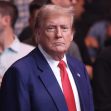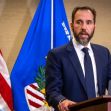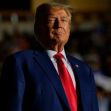In a decision on Monday, the U.S. Supreme Court delivered a setback to the prosecution of former President Donald Trump on charges related to his alleged attempts to overturn the 2020 election results. The court's 6-3 ruling granted former presidents sweeping immunity for their official acts while in office, potentially reshaping the landscape of presidential accountability.
The court's ruling, authored by Chief Justice John Roberts and joined by Justices Clarence Thomas, Samuel Alito, Neil Gorsuch, Brett Kavanaugh, and Amy Coney Barrett, emphasized that a president "may not be prosecuted for exercising his core constitutional powers" and enjoys "presumptive immunity" for all official acts. This decision effectively dismissed key parts of the prosecution's case against Trump, particularly allegations involving his use of the Justice Department to advance claims of election fraud and efforts to submit false elector slates.
"The president is entitled, at a minimum, to a presumptive immunity from prosecution for all his official acts," Roberts wrote. However, he clarified that "the president enjoys no immunity for unofficial acts, and not everything the President does is official."
The ruling sends the case back to U.S. District Judge Tanya Chutkan, who will now have to navigate the Supreme Court's new standards. Chutkan must determine which parts of the case can proceed under the court's directive that judges cannot inquire into Trump’s motives when distinguishing between official and unofficial acts.
Chutkan has shown little patience for delays and emphasized that Trump's political campaign will not influence his treatment in court. With the trial expected to last six to eight weeks, the timing could significantly impact the 2024 presidential election, where Trump seeks to reclaim the presidency from Joe Biden.
Judge Tanya Chutkan, appointed by former President Barack Obama, will play a crucial role in determining the next steps in this case. Known for her no-nonsense approach and courtroom experience, Chutkan has previously shown little tolerance for delays and has emphasized that Trump's political campaign will not affect his treatment in court.
Judge Chutkan has promised to give Trump approximately 90 days to prepare for trial once the case resumes in her courtroom. The trial is expected to last six to eight weeks. The timing is significant as it could determine whether a jury hears evidence of Trump's alleged election subversion before the November 5, 2024, election, where Trump seeks to reclaim the presidency from Joe Biden.
Chutkan has a track record of handing down stern sentences for defendants involved in the January 6, 2021, Capitol riot. She rejected Trump's bid to block a House committee from accessing White House records, famously stating, "Presidents are not kings, and plaintiff is not president."
Judge Chutkan's handling of Trump's case contrasts sharply with that of Florida-based Judge Aileen Cannon, overseeing Trump's classified documents case. Cannon, nominated by Trump, has been more receptive to his defense arguments and delayed trial proceedings, whereas Chutkan has moved swiftly to dismiss claims of presidential immunity.
The Supreme Court's conservative majority ruling on presidential immunity and a separate decision raising the legal standard for federal obstruction charges are central to Chutkan's forthcoming decisions. Two of the four counts against Trump relate to obstruction, and prosecutors have indicated their intent to proceed with these charges.
The decision drew a stark ideological divide among the justices. In a dissent joined by Justices Elena Kagan and Ketanji Brown Jackson, Justice Sonia Sotomayor criticized the ruling for undermining the principle that no one is above the law.
"A rule of judicial humility gives way to a rule of judicial hubris," Kagan wrote. "In recent years, this court has too often taken for itself decision-making authority Congress assigned to agencies."
The Biden campaign echoed this sentiment, stating, "Donald Trump thinks he’s above the law and is willing to do anything to gain and hold onto power for himself."
Trump, celebrating the ruling on his social media platform, wrote, "Big win for our Constitution and democracy. Proud to be an American!"
This ruling follows other significant Supreme Court decisions affecting Trump. The court recently narrowed the scope of an obstruction charge against Jan. 6 rioters and Trump, and restored his eligibility for the Colorado ballot after being disqualified under a constitutional provision barring insurrection participants from future office.
The decision also comes amid ongoing debates about the power and accountability of federal agencies, highlighted by recent Supreme Court rulings that limit agency authority and require clear congressional authorization for major regulatory actions.






